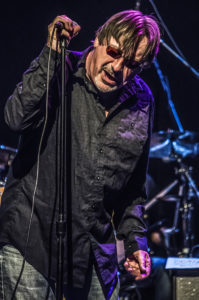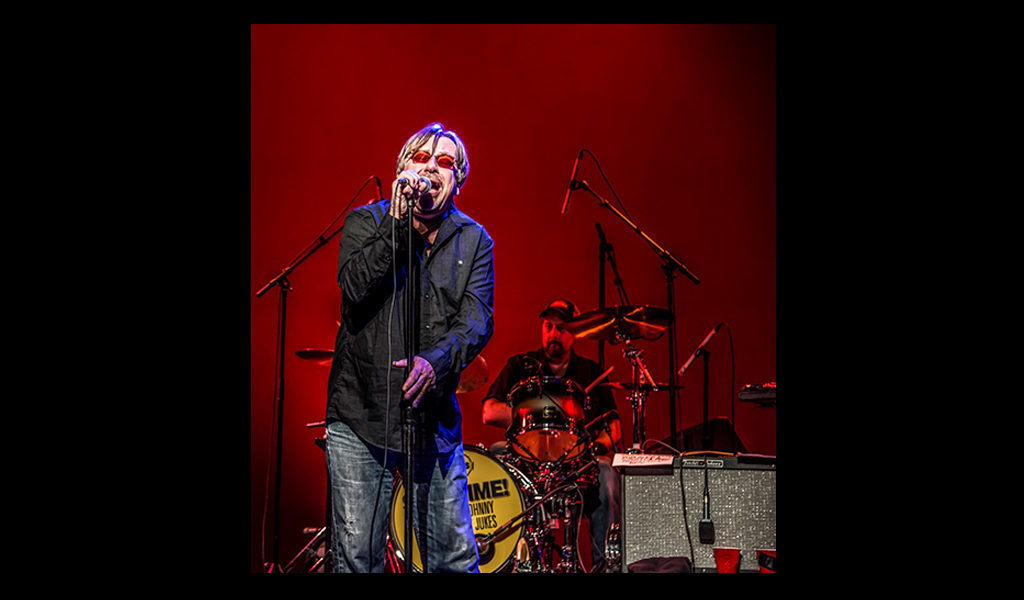
Southside Johnny and the Asbury Jukes have been a staple in New Jersey since 1975. With a true Jersey Shore sound, John Lyon cut his teeth in Asbury Park, New Jersey, among the likes of Max Weinberg, Steve Van Zandt, and Bruce Springsteen. In fact, Southside Johnny co-founded the Asbury Jukes band alongside Little Steven Van Zandt.
Recently, we spoke with Southside Johnny about his influences, working as a technical advisor and writing for movies as opposed to being on stage, and upcoming projects.
Interview by Lauren Leadingham for American Blues Scene:
Being a Blues and R & B artist in America in the 70’s, how was your music received at the time? I know that was a time when our country was somewhat divided racially; how did that impact your music or ability to advance?
Southside Johnny:
Um, you know, I never thought of it. We played the music we wanted to play and we got an audience. People liked that kind of music. You have to remember that there was a big blues revival in the early 60’s where a lot of pre-war blues musicians, like Mississippi John Hurt, Furry Lewis were rediscovered. And then, guys like the Paul Butterfield Blues Band, John Hammond, and the Rolling Stones; a bunch of other people came out.
So, to us, it was just sort of a natural progression and I think our audiences were astute enough not to, you know, they knew what kind of music we’re trying to make and they supported us. So, we never felt there was any kind of separation or anything like that. We played; James Cotton came by and jammed; it was really cross. There was a lot of cross-talk between all different bands, black and white; yeah it was a really cool thing.
So, in the 50’s and 60’s, who would you say your influences were?
My big influence when I was 14 years old was Jimmy Reed and Sonny Boy Williamson. I grew up listening to blues because my parents listened to T. Bone Walker and Big Joe Turner, Wynonie Harris and the Blues Shouters, and that kind of thing. So, to me, it was just the music that people played in their house. Um, but, there was a black radio station from Newark, New Jersey and they played a lot of blues. They played Elmore James and Muddy Waters. My brother and I would listen to this little radio and we would hear this stuff, and it just sounded great.
It sounded as though there was life outside of this little Methodist-retirement-town kind of place… and you know, we were young and we gravitated to the energy of it, and the feeling of excitement. It just, sort of…it just seeped into us, you know? We didn’t really like the Beach Boys and a lot of pop music; it just didn’t really appeal to us.
I understand you wrote with Steve Van Zandt very early on. I’m curious as to how that relationship was formed.
Well, there was a club called the Upstage Club, and it was open from 8 o’lock at night until 5 o’clock in the morning, and there was no alcohol served. So, you know, if you were young, you could still get in and stay all night. And I lived about a half a mile from there, and I would walk over there every day around 8 or 9 o’clock and stay as long as I could, you know, school or not; and just play, and just get up and jam and Steven came one time with his band and we met and we liked a lot of the same music; Bruce came; so many different people came to play there.
And you know, we ended up being friends and sharing all the different music that we had, whether it be rockabilly for Gary Tallent, you know, all the guitar hero stuff; Hendrix and Jeff Beck, from Steven and Bruce, and I liked a lot of blues and we just kind of shared all of those influences. And Steven and I were in a number of bands together, including an acoustic duo, where we played a lot of blues.
Oh, that sounds amazing.
Yeah, it was really great. I mean, we didn’t know that we weren’t supposed to, or were supposed to; we didn’t really think of those things. We just did the music we liked, along with soul music and some rock and roll, and we just kind of went out and did it.
How do you enjoy acting as a technical advisor and writing for movies? How does that compare to your stage life?
Oh, there is no comparison. I would much rather be on stage.
Yes, I figured.
Yeah, movies are a lot of standing around. They have to move the lights; every take, they have to move the lights, move the camera, and it takes about an hour.
The stage gives you life?
Yeah, and when you’re on stage, anything can happen. You’re kind of in control, but, not really. You just kind of carry it along with the night.
It’s a different energy.
Yeah, the energy is much more satisfying, too. So, I would much rather do that, but, you know, I’m always curious to see what goes on behind the scenes, so it’s fun to do those jobs, too.
Speaking of stage performances, how do you manage to keep the level of energy you have on the stage?
Well, by doing the songs you really love to do and having a really great band. Right at this moment, I have the best band I think I’ve ever had and that’s in 40 years of singing.
I agree. What’s your secret, though?
There’s the energy of the audience and the song that you love singing, and the band really kicking; you know, really cranking it, you know, and you’re just carried away. Two hours passes by and you go, ‘wait, I’m not done yet!’
It’s all about chemistry.
Yeah and also, you know, you spend a lot to time; like we’re coming to Florida, we’ll be on the bus and we’ll be watching movies, sleeping, reading; doing all those things, but really, you’re just biding time until you get on the stage. Once you get on stage, it all makes sense.
Well, it sounds like you guys are really doing it for the music, I always love to hear that.
Well yeah, I mean, it doesn’t; I make a decent living, but I’ll never be rich. I’ll never be a billionaire or anything like that, but I don’t really care. I mean, I still love playing and like I say, I’ve got a great band. So to me, it’s just fun traveling and playing music and I get to sock away some money for retirement, but I don’t know when that’s ever going to come, you know.
What’s next for Southside Johnny? Are you working on anything right now?
Yeah, I’m working on an album my publicist told me not to talk about, but I’m working on a Jazz; more jazz… it’s like an album with my saxophone player. Uh, I got another Jukes album I’m trying to get rolling. Um, you know, just writing and all that stuff, and it will be a follow up to ‘Soul Time.’ I’d like to make another Poor Fools, which is my little acoustic band, so I’ve got three albums in my head to do in the next year-year and a half, two years, and a lot of touring. This year, 2017 is going to be very heavy on touring. So, it’s just more work.
Your fans will like that.
No, you know, I want to do it, and then there’s times I go, ‘I’m so tired.’
Yeah.
But you know, I mean, I always consider it a great privilege that I’ve been able to do this for this long because I know a lot of better musicians.
Well, your fans are lucky to have you, though.
No, I’m lucky to have my fans. Really, yeah, the fans have kept me going, too. I mean, we get to go all around the world and people come and see us play. So, you can’t ask for more than that. I’m glad you’re writing about blues. It is a universal music and it’s a timeless music and it has filled my life with joy and insight.
Yes, and you never stop learning. I’m still learning about it, you know?
Yeah, I mean, I just like 6 months ago, bought a Mississippi John Hurt CD ’cause I hadn’t heard him in years and years. So, since, I guess, the 60’s and early 70’s when I was listening to that pre-war stuff. I loved it; it was just, it had that kind of open-hearted playing and, uh, it teaches you the lessons you need to know to keep making music. It’s the intensity; it’s the open-heartedness, all the different phases.
Yes, I think it opened a lot of doors for other genres.
I play all kinds of music. I just was in Jamaica, playing with some Reggae musicians and that was fun, too.
I like some upstroke; I like some old Reggae.
Yeah, Reggae’s cool. I mean, uh, a lot of that stuff is cool.
Yeah, I like Toots and the Maytals. And, you know, a lot of those bands have really good guitar licks. Like the 60’s original Ska bands, they aren’t really known for that, but they do have that quality.
I just played with Earl “Chinna” Smith and he’s a guitar player, and he played a lot of blues. It’s very organic with those people. They don’t try to overthink it.
I’ve always thought the more simplified, the better it sounds.
Well, you know, I don’t like a million notes a minute, but everybody has their own taste and I’m happy that everybody loves music. That’s all I care about.
Yes, we’re all here for the music.
That’s right.


